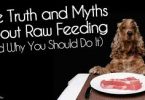Before you begin spicing up Spot’s dinner, it’s very important to realize that some foods humans eat should never be fed to your dog. These are foods that are not recommended for your dog! This information is based on dog health data published primarily by ASPCA. The information is generally standardized but may vary based on source.
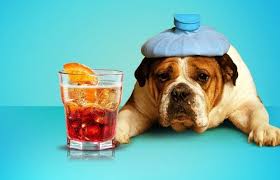 Alcohol-(Also known as ethyl alcohol, grain alcohol or drinking alcohol) Even ingesting a small amount of a product containing alcohol may cause significant intoxication. In severe cases, coma, seizures, and death may occur.
Alcohol-(Also known as ethyl alcohol, grain alcohol or drinking alcohol) Even ingesting a small amount of a product containing alcohol may cause significant intoxication. In severe cases, coma, seizures, and death may occur.
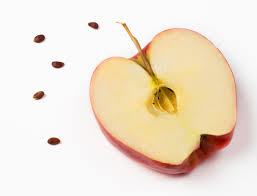
Apple Seeds
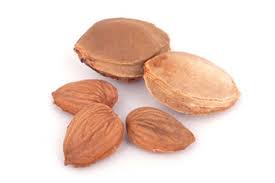 Apricot Pits
Apricot Pits
 Avocados-The leaves, fruit, seeds and bark. Contain persin, an oil soluble toxin, which typically only causes diarrhea and vomiting. In some animals, damage to heart muscle cells may occur, leading to heart failure.
Avocados-The leaves, fruit, seeds and bark. Contain persin, an oil soluble toxin, which typically only causes diarrhea and vomiting. In some animals, damage to heart muscle cells may occur, leading to heart failure.
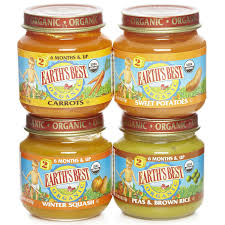 Baby Food-May contain onion powder, which may be toxic to dogs. if you feed baby food, check the label.
Baby Food-May contain onion powder, which may be toxic to dogs. if you feed baby food, check the label.
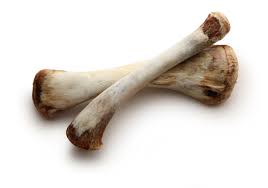 Bones (Cooked) -Fish, poultry, or other meat sources. Dog’s may choke or sustain a critical injury if bone splinters and becomes lodged in or punctures digestive tract.
Bones (Cooked) -Fish, poultry, or other meat sources. Dog’s may choke or sustain a critical injury if bone splinters and becomes lodged in or punctures digestive tract.
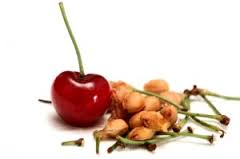 Cherry Pits
Cherry Pits
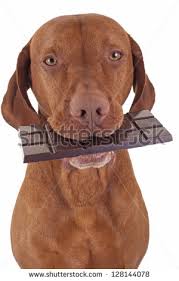 Chocolate- Toxic compounds are caffeine and theobromine, which belong to a group of chemicals called methylxanthines. Darker chocolates are more dangerous, however all chocolate should be avoided.
Chocolate- Toxic compounds are caffeine and theobromine, which belong to a group of chemicals called methylxanthines. Darker chocolates are more dangerous, however all chocolate should be avoided.
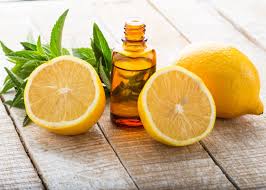 Citrus Oil Extracts-Contains limonene and linalool which are metabolized in the liver and may result in liver damage or failure.
Citrus Oil Extracts-Contains limonene and linalool which are metabolized in the liver and may result in liver damage or failure.
 Coffee & other caffeinated drinks-In all forms, including coffee, tea, as well as grounds. Depending on the dose, may produce the same toxic and potentially fatal effects as chocolate.
Coffee & other caffeinated drinks-In all forms, including coffee, tea, as well as grounds. Depending on the dose, may produce the same toxic and potentially fatal effects as chocolate.
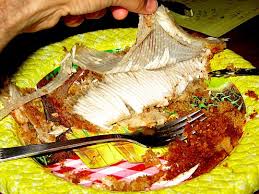 Cooked Fish– Salmon and other cooked fish. Because of small bones, steer clear of fresh cooked salmon and other fish. Canned boneless fish is safe.
Cooked Fish– Salmon and other cooked fish. Because of small bones, steer clear of fresh cooked salmon and other fish. Canned boneless fish is safe.
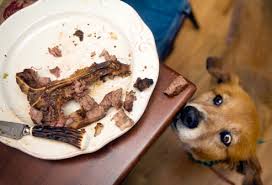 Fat Trimmings-You have trimmed the fat because you have chose not to eat it for health reasons, so why feed it to your dog.
Fat Trimmings-You have trimmed the fat because you have chose not to eat it for health reasons, so why feed it to your dog.
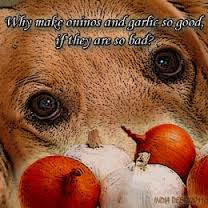 Garlic–Onions-You may feed garlic but in moderation
Garlic–Onions-You may feed garlic but in moderation
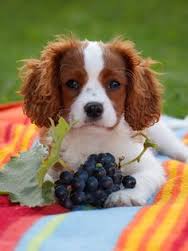 Grapes and raisins-Because they are condensed, raisins are more dangerous than grapes, avoid cereals and cookies with raisins.
Grapes and raisins-Because they are condensed, raisins are more dangerous than grapes, avoid cereals and cookies with raisins.
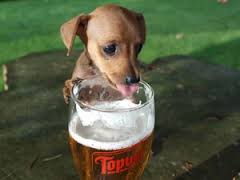 Hops-Fresh or cooked-Cultivated hops used for brewing beer have been associated with potentially life threatening signs in dogs who have ingested them.
Hops-Fresh or cooked-Cultivated hops used for brewing beer have been associated with potentially life threatening signs in dogs who have ingested them.
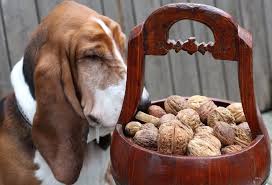 Macadamia Nuts
Macadamia Nuts
 Nutmeg
Nutmeg
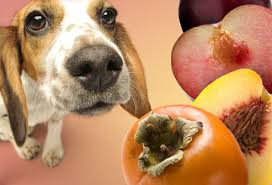 Peach Pits
Peach Pits
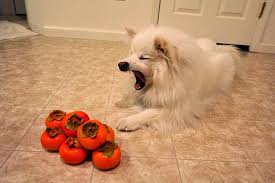 Persimmon Seeds
Persimmon Seeds
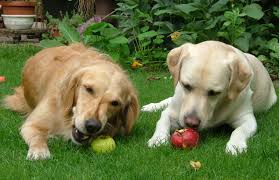 Plum Pits
Plum Pits
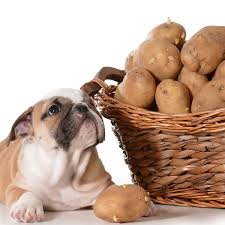 Potato Peels-green parts and eyes only, the rest of the skin is okay. Discard any green or sprouted portions of the potato. This includes all types of potatoes.
Potato Peels-green parts and eyes only, the rest of the skin is okay. Discard any green or sprouted portions of the potato. This includes all types of potatoes.
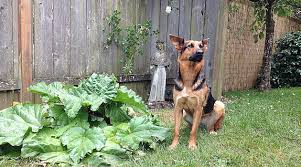 Rhubarb Leaves-Contains soluble calcium oxalates, which may cause kidney failure, tremors and salivation in dogs.
Rhubarb Leaves-Contains soluble calcium oxalates, which may cause kidney failure, tremors and salivation in dogs.
 Salt, Baking Soda and Baking Powder-Large amounts of salt may produce excessive thirst and urination, or even sodium ion poisoning.
Salt, Baking Soda and Baking Powder-Large amounts of salt may produce excessive thirst and urination, or even sodium ion poisoning.
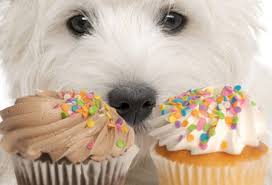 Sugary Foods-May lead to obesity, dental problems and possibly diabetes mellitus.
Sugary Foods-May lead to obesity, dental problems and possibly diabetes mellitus.
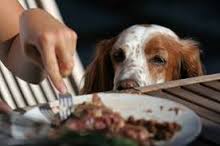 Table Scraps-Are not nutritionally balanced
Table Scraps-Are not nutritionally balanced
 Tea
Tea
 Tobacco-Nicotine found in cigarettes and tobacco products is highly toxic. Exposure to second hand smoke may result in harmful inflammatory changes in airways and lungs.
Tobacco-Nicotine found in cigarettes and tobacco products is highly toxic. Exposure to second hand smoke may result in harmful inflammatory changes in airways and lungs.
 Yeast Dough-Made with live yeast can be very hazardous.
Yeast Dough-Made with live yeast can be very hazardous.
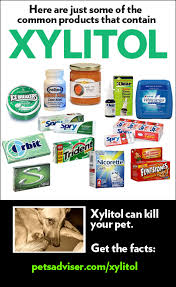 Xylitol-A non caloric sweetener used in diet foods and sugar free gum can be highly toxic to some dogs. May lead to a rapid severe drop in blood sugar levels, disorientation and seizures. In large amounts, may cause liver failure, which may be fatal.
Xylitol-A non caloric sweetener used in diet foods and sugar free gum can be highly toxic to some dogs. May lead to a rapid severe drop in blood sugar levels, disorientation and seizures. In large amounts, may cause liver failure, which may be fatal.
- Too much protein in your dog’s diet can overwork their liver and kidney as they work to remove the excess protein the body cannot absorb. Too little protein can lead to growth problems for your puppy.
- Too much fat in your dog’s diet can lead to excess poundage on your puppy. Too little fat, though, results in dull coat and flaky skin.
- Too many vitamins can stress your dog’s organs and can even lead to bladder stones, while a lack of vitamins will make your dog weak and tired.
- Fiber plays an important role in a balanced diet. Too much fiber leads to gas. Too little can cause loose stools
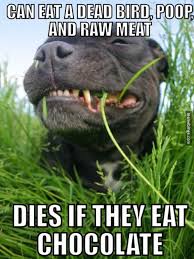
If your dog does ingest a toxin there are a couple of symptoms to be aware of. Usually within the first 12 hours, the dog may experience diarrhea, lethargy and vomiting. Once toxicosis sets in, the dog may experience a loss of appetite and increased urination.The dog will start to develop bad breath, mouth ulcers, a rise in blood pressure and eventually fall into a coma. Death may occur due to kidney failure.
If you think your dog may have come in contact with a toxin, contact your veterinary office or emergency clinic immediately to avoid possible death.
Katie Newman




